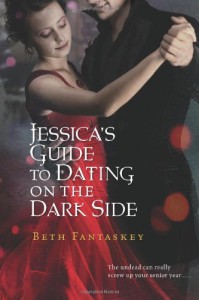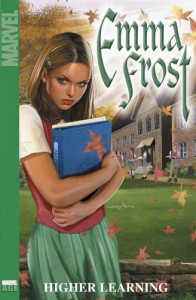Killing Me Slowly
A leopardess who learned how to dance. And read.
 This was probably the shitties fucking outcome the Twilight storyline could have possibly had, and I'm not exaggerating here, this shit was AWFUL. The stupidest thing I've read or seen in Buffy-associated media, bar none. They've jumped the shark so far they're in fucking space now. There's no coming back from something this fucking dumb. If I'm not being clear enough: this was not clever, it wasn't enjoyably silly, it wasn't so-bad-it's-good, or whatever the writers were going for, this was jump plain and simply STUPID.
This was probably the shitties fucking outcome the Twilight storyline could have possibly had, and I'm not exaggerating here, this shit was AWFUL. The stupidest thing I've read or seen in Buffy-associated media, bar none. They've jumped the shark so far they're in fucking space now. There's no coming back from something this fucking dumb. If I'm not being clear enough: this was not clever, it wasn't enjoyably silly, it wasn't so-bad-it's-good, or whatever the writers were going for, this was jump plain and simply STUPID.Basically:
Angel is Twilight because IDK something about uniting Buffy's enemies behind an ally to minimize the damage, so it's totes ok that Angel beat the shit out of her and killed dozens of innocent Slayers, GREATER GOOD and whatnot. But really, it was all because of some prophecy that apparently Giles has known about the ENTIRE TIME, but in fucking SEVEN SEASONS of television had never mentioned, even though he knew Buffy would be the ones, because REASONS. So Angel and Buffy have superpowers, because prophecy, and are magically compelled to literally FUCK A UNIVERSE INTO EXISTENCE, I SHIT YOU NOT, because prophecy, and then IDK are supposed to retire there or something, because they're SO MUCH BETTER than everyone else and they TOTES DESERVE IT, but staying would basically fuck over the universe that everyone else is left in, which Angel is TOTALLY OKAY WITH, but Buffy's not, so they leave their perfect universe, which then GETS PISSED NO REALLY LITERALLY THE UNIVERSE GETS ANGRY and possesses Angel and kills Giles, but that's not til the next volume. For now they just chase after some bullshit seed that was in SUNNYDALE ALL ALONG LOL IRONY and guarded by the master because IDK THEMATIC OR SOMETHING even though he's probably the EASIEST VILLAIN. WHAT IS THIS SHIT I DON'T EVEN.
In conclusion don't waste your goddamn time this season is shit, just close your eyes and be thankful the series ended the way it did in season 7.
 I've spent most of the night trying to sort out how I feel about this book, and I think the gist of what I've come to is "disappointed". I was really psyched for The Girl Who Would Be King. I'm a fan of the author's podcast; she seems like a sensible, gender-aware woman, and I was super-excited by the idea of a female-positive YA superhero book that could avoid all of the traps that make this genre so frustrating.
I've spent most of the night trying to sort out how I feel about this book, and I think the gist of what I've come to is "disappointed". I was really psyched for The Girl Who Would Be King. I'm a fan of the author's podcast; she seems like a sensible, gender-aware woman, and I was super-excited by the idea of a female-positive YA superhero book that could avoid all of the traps that make this genre so frustrating.Also, that is an amazing cover. I mean goddamn, Stephanie Hans should do every cover. This is the same woman who did Journey Into Mystery covers too, omg.
Ahem. ANYWAY. The point is, my expectations were unusually high for this book, which is why, even though I wouldn't call it "awful", The Girl Who Would Be King was such a let-down. I was expecting something amazing, and while there is a good story in here, and there are things that I liked about it, there was also a disheartening amount of...flab.
I don't just mean "flab" in the sense of padding. I mean, yes, the book is three-hundred-some-odd pages of super-dense writing, and no, it doesn't need to be, but it's not just about that. It's all of it. When I say "flab", I mean, like, untrained muscle. There's so much in this book that could have been amazing if it had been more focused, honed to a finer point, crafted with more deft skill. It's in dire need of a good pruning.
One of the problems that's really clear in retrospect is that there's not a whole hell of a lot going on, here. Which isn't to say the book is devoid of stuff happening, or even action - in fact, there's actually some really good action towards the end - but what it is completely devoid of are twists, turns, and dramatic tension. What you read in that summary, up there? That's exactly what you get from The Girl Who Would Be King.
The obvious object, the essential premise of the book, is that these girls embodying these opposing forces will fight. That's what it's building up to: one big, powerhouse showdown, and that's fine, I guess, but I expected...more. Some sort of twist, a play, like maybe the girl who is compelled to maintain order would go all Justice Lord overboard with it, and only the freedom-loving "bad girl" could stop her. But it quickly became clear that wasn't going to happen; it's straight black and white, chaotic evil vs. lawful good, arbitrary compulsion to save vs. arbitrary compulsion to kill.
The thing is, once you come to understand that there will be no subversion of that expectation, all that's left is the confrontation. Lola vs. Bonnie. You know it's coming, and that inevitability just makes you that much more aware of how long the road to get there is. I spent the book glancing at my watch, so to speak, going "Okay, yes, that's fine, but when are they going to meet?"
What I'm trying to say here is that there isn't really a "plot". No particular obstacles to overcome, no villains to uncover, no motives to discover - just the daily lives of two girls who will inevitably fight. The closest we get to a mystery is the question of what the girls are/where their power comes from, and that...well, that whole mythology opens up another can of worms that I'll talk about later. What I'll say now is that, while it provided some of the more interesting segments of the book, it was far too sporadic and thin to keep a book that long going.
So, not a lot of plot. Which, I suppose, isn't exactly necessary. You could argue that it's a character study, and you would probably be right, and that would be fine, except that, as a character study, it is utterly done in by the writing.
I've said before that I'm not a prose Nazi, okay, and it's true. Not like that's something to be proud of, and I'm trying to work on it, but being up front, I just don't really notice bad or awkward writing unless it is really bad or awkward.
The writing in this book is really awkward.
The word that kept coming to my mind was "fumbling". I felt like the words that were being strung together here were often clumsy and imprecise. I can't really explain it better than that. Sorry. Part of that might have been the tone, which was casual to the max, but I think more of it is owed to the super-frickin'-tell-y writing style.
This is actually a problem that I've run into with first-person perspective YA in general - it seems like so many books use that as an excuse to dump the character's every single innermost feeling on us without an ounce of subtlety. "I felt sad, I felt happy, I felt slightly perturbed that my coffee was only lukewarm", blah blah blah. It usually goes hand-in-hand with that conversational mess of a storytelling style, where even when the protagonists are actually experiencing things, it feels like they're just telling you about it in some sort of third-hand, relayed experience. You know what happened, what they did, and how they felt, and yet you still end up feeling detached from it all. Which I'm pretty sure is the polar opposite of the first-person perspective's goal.
The Girl Who Would Be King has exactly that problem, and makes it worse by frequently compressing long periods of time and activity into actual summaries that can last for pages. I understand that the book covers months of the main characters' lives - years, in Bonnie's case - and that you can't chronicle every single day, but there are literally paragraphs of straight-up telling. This is important stuff! These are character developments, and oh god, relationship developments that happen totally off screen, and we're still expected to care about them?
For example...
Read full review at You're Killing.Us.
 Let's see: sexist, homophobic, racist, and hyper-sexualized, any kind of cute exchanges between Harley and Ivy are completely overridden by the truly awful, bafflingly childish, and offensive writing. Very disappointed in Dini, Timm, and everyone involved. T&A in what reads like a children's comic? STAY CLASSY, GUYZ.
Let's see: sexist, homophobic, racist, and hyper-sexualized, any kind of cute exchanges between Harley and Ivy are completely overridden by the truly awful, bafflingly childish, and offensive writing. Very disappointed in Dini, Timm, and everyone involved. T&A in what reads like a children's comic? STAY CLASSY, GUYZ.
 Some friends and I took this one on in a podcast review. The status updates should give you some idea of how that went.
Some friends and I took this one on in a podcast review. The status updates should give you some idea of how that went.Short version: Kinda like Hush, Hush with slightly less psychopathic and/or spineless protagonists. Still shitty, though.
 Superman died for your sins.
Superman died for your sins.Seriously though, I feel like this could have been better if there had been less goofy shit and more level-headed characters stuff. I can see why people might like this, but Superman for All Seasons still knocks it clean out of the ballpark.
 Yeah, I think we should spend two whole issues of a limited series devoted to chronicling the last few months (year?) or Superman's life having Supes, Samson, and Atlas get into a pissing contest for possession of Lois.
Yeah, I think we should spend two whole issues of a limited series devoted to chronicling the last few months (year?) or Superman's life having Supes, Samson, and Atlas get into a pissing contest for possession of Lois.Yeah, that sounds about right.
 Shitty McShit. Terrible, over-sexualized art (she's a teenager for chrissakes), boring, childish, cliche storyline. Emma deserves better.
Shitty McShit. Terrible, over-sexualized art (she's a teenager for chrissakes), boring, childish, cliche storyline. Emma deserves better.
 So I've decided to try a little experiment with the review of Birthmarked. Every so often, a couple of friends and I get together on Skype to chat, and occasionally to discuss books that we've all read. This time, we decided to record it. Thus we have an extremely amateur podcast (we even forgot to introduce ourselves D:), in which Ollie, of Olivia's Secret Reading Room, Robin Connelly, and I (Cyna), discuss our thoughts on Birthmarked, in lieu of a written review.
So I've decided to try a little experiment with the review of Birthmarked. Every so often, a couple of friends and I get together on Skype to chat, and occasionally to discuss books that we've all read. This time, we decided to record it. Thus we have an extremely amateur podcast (we even forgot to introduce ourselves D:), in which Ollie, of Olivia's Secret Reading Room, Robin Connelly, and I (Cyna), discuss our thoughts on Birthmarked, in lieu of a written review.You can listen at Papercuts Podcast!
 Very nice art, very captivating story until around issue 3, where you realize that the idea of the story as a "mystery" is very misleading. Predictable, wtf-ery flaws in continuity (how did they find out what the name of the bad guy was??). But it's a good idea, perhaps Snyder's proto-Court of Owls, and has nice interplay between the characters, even if we don't really get enough.
Very nice art, very captivating story until around issue 3, where you realize that the idea of the story as a "mystery" is very misleading. Predictable, wtf-ery flaws in continuity (how did they find out what the name of the bad guy was??). But it's a good idea, perhaps Snyder's proto-Court of Owls, and has nice interplay between the characters, even if we don't really get enough.The backup story, featuring French-Muslim Batman, Inc member Night Runner is very much worth the price of admission, though.
 Would have rated higher, because I love McDuffie's characterization and this feels SO MUCH like the Justice League cartoon I grew up with, but...Benes. His art, especially the hyper-sexualization of the heroines, is godawful and works hard to tank McDuffie's otherwise enjoyable work.
Would have rated higher, because I love McDuffie's characterization and this feels SO MUCH like the Justice League cartoon I grew up with, but...Benes. His art, especially the hyper-sexualization of the heroines, is godawful and works hard to tank McDuffie's otherwise enjoyable work.
 Boring and tedius and unnecessarily confusing. Classic Grant Morrison. I'd say skip the main book and read the Sholly Fish back-up stories. They're the only reason this book is getting two stars instead of one. They've got more heart and charm in a few pages than this book does in its entirety.
Boring and tedius and unnecessarily confusing. Classic Grant Morrison. I'd say skip the main book and read the Sholly Fish back-up stories. They're the only reason this book is getting two stars instead of one. They've got more heart and charm in a few pages than this book does in its entirety.
 This is the kind of Superman story I want to read more often. Hell, this the kind of comic I want to read more often. Rather than focusing on gratuitous action, gore, angst, or fanservice, Superman for All Seasons set out to tell a very quiet, thoughtful, heartfelt story, and it succeeded.
This is the kind of Superman story I want to read more often. Hell, this the kind of comic I want to read more often. Rather than focusing on gratuitous action, gore, angst, or fanservice, Superman for All Seasons set out to tell a very quiet, thoughtful, heartfelt story, and it succeeded.I love that this book made me care, about everyone, even characters I didnt know much about or have much use for. By the end of the first chapter, I cared about Clark, the Kents, Lana Lang, Lois Lane, even Smallville - both its inhabitants and the town itself. There's just so much heart, here.
The story is told in four issues that chronicle the first year of Clark Kent's life as Superman. Each correspond to a different season, narrated by a different character (Pa Kent, Lois Lane, Lex Luthor, and Lana Lang), and each issue gives us a little more insight, into both the narrating character, and Superman himself.
I appreciated the Smallville chapters (Spring and Winter) most, myself. They bookend the book well in terms of theme and development. I loved seeing Clark Kent when he's not being Superman, when he's just a guy coping with self-doubt, trying to find his place, showing the uncertainty that Superman can't, to the people who matter most to him. The comfort that he finds in his parents, his best friends, even his dog, go a long way in making Superman a flawed, but still admirable character, as opposed to a bland ideal.
This is definitely a book for people who want to know Superman as more than just an action figure, or a grimgritty angsty loner. No pre-existing comic book knowledge required; this book is self-contained, and will tell you all you ever need to know about Superman.
 Was this "progressive" in 2002? That's pretty sad. It's a pretty textbook manpain-and-fridging combo, made most obvious by the fact that the majority of the "Hate Crime" story arc focuses on Kyle's anger and his need to avenge the brutal attack of his gay teenage assistant, rather than the actual victim of the attack, Terry.
Was this "progressive" in 2002? That's pretty sad. It's a pretty textbook manpain-and-fridging combo, made most obvious by the fact that the majority of the "Hate Crime" story arc focuses on Kyle's anger and his need to avenge the brutal attack of his gay teenage assistant, rather than the actual victim of the attack, Terry.But I guess the only way to get people to care about LGBT characters is the victimize them and then filter it through the perspective of a straight bystander, amirite?







